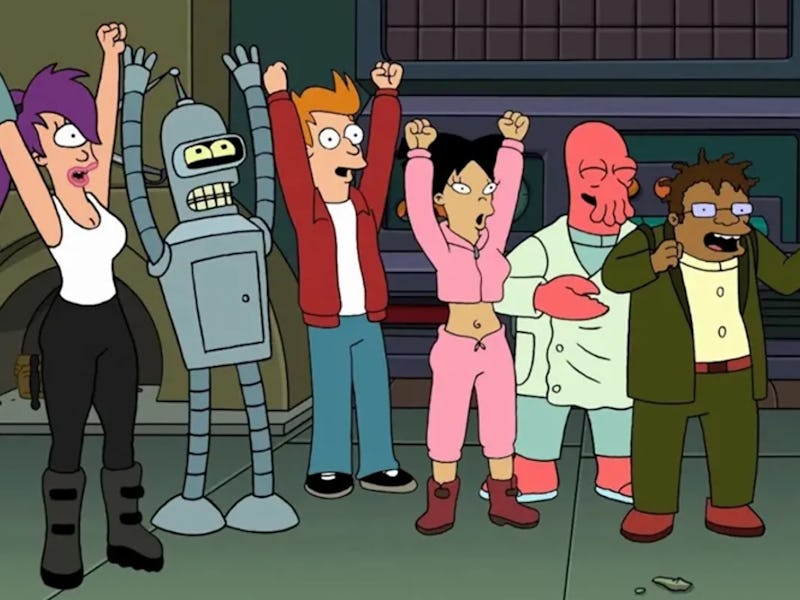Futurama’s Stupid Portrayal of the Future is Secretly Brilliant
My God! It's the future.

Predicting the future is a sucker’s game. For every sci-fi story hailed for its uncanny prescience, dozens portray the coming years with about as much accuracy as a boardwalk psychic describing your future spouse. 2001: A Space Odyssey remains a masterpiece, but we weren’t visiting Howard Johnson’s orbital branch by the time the calendar caught up to Stanley Kubrick’s vision.
That’s part of what makes Futurama such a joy to watch. Matt Groening and David X. Cohen’s sci-fi comedy was never seriously trying to predict life in the year 3000, and the fourth millennium was so far removed from its March 1999 debut that Futurama had the freedom to do what was funny, not sensical. Its future still has rules and structure, but those fiddly details were always bent for the sake of a good story.
“Space Pilot 3000” received mixed reviews and looks a little primitive today, but it still does a remarkable job of grounding both protagonist and viewer in an overwhelming future. On the eve of Y2K, slacker pizza delivery boy Philip J. Fry is dumped by his girlfriend and tricked into visiting a cryogenics lab by a dumb prank order. Frustrated, he kicks back and toasts the arrival of another lousy millennium, only to accidentally tumble into an open cryogenics tube. When he finally unthaws on December 31, 2999, he encounters a delightful slurry of golden-age sci-fi tropes and contemporary looniness.
Pneumatic tubes whizz the busy people of New New York City through the air, but cheap suicide booths are available too. As Fry befriends Bender, a profane, alcohol-powered robot, and Leela, a one-eyed, zero-nonsense alien, we learn that the future is simultaneously wonderful, terrifying, and completely mundane. Sure, Earth is now awash in new species and miracle technologies, but everyone still has to go to work. A millennium removed from his lousy life, Fry winds up a delivery boy again, this time for Planet Express shipping. The parts of the far-flung future that involve paying rent are actually quite easy to grasp.
There’s a sense of gleeful abandon to the way Futurama portrays itself, like every idea was thrown in just to see what would stick. Some ideas, like every citizen needing a dystopian identity chip and an early running gag about owls infesting New New York City like pigeons before them, were soon abandoned. But as the show’s early seasons unfolded, the 31st century developed a strong sense of place.
In one of many throwback touches, Planet Express’ ship looks like it flew out of a ‘50s comic book.
Here, the moon is a dumpy tourist trap populated by hillbillybots. New New York’s sewers, and the ruins of Old New York below them, are full of mutants. Americans have abandoned baseball for the even more esoteric blurnsball. An inept knockoff of Star Trek’s Federation run by egomaniacs and wimps patrols the stars. Oh, and an alternate universe has been discovered, but its only distinct characteristic is that everyone dresses like a cowboy.
Sit a young viewer down with Futurama today and they’ll be baffled by guest stars like Rich Little, Pauly Shore, and Ron Popeil (yes, the Ron Popeil). All futuristic sci-fi, even the comedy, is tied to the era that created it, and the fact that Al Gore guest starred twice (his head is conveniently kept alive, alongside so many other celebrities, with 31st-century technology) speaks to the year Futurama debuted. But those confused viewers will still quickly grasp every sci-fi idea that makes the future seem wild yet predictable. It’s all very silly, but the mundane, workaday concerns perfect for comedy haven’t changed a bit.
In some ways, Futurama did presage the future. Clicky articles like “Times Futurama Freakishly Predicted The Future” mostly just express shock and awe at basic joke construction, but what Futurama really saw coming was anarchical sci-fi comedies like Rick and Morty and Solar Opposites. Meanwhile, that some of its running subplots were teased with Easter eggs was a preview of a burgeoning internet fandom’s exhaustive Lore obsession. “Space Pilot 3000” hid secrets that would pay off later, and it was fun to learn the truth in the days before YouTubers immediately picked every facet of pop culture to bloody scraps.
New New York is ridiculous, but it’s easy to go with the flow.
After a bit of a wobbly start, Futurama hit its stride and told some acclaimed — and surprisingly emotional — stories. Despite zaniness that would encompass time travel, alien conquest, a murderous Santa-bot, and an army of Lucy Lius, Futurama is best remembered for its episodes that reflected on regret and loss, albeit while still cramming in as many dumb jokes as possible.
Episodes like “Jurassic Bark,” about Fry’s attempt to revive his fossilized dog, and “The Luck of the Fryrish,” about Fry’s complicated relationship with his brother, are reminders that it doesn’t matter how accurate a sci-fi future is as long as you care about the humans (and mutants, aliens, and robots) that occupy it. That simple lesson keeps Futurama compelling today, even as countless big-budget sci-fi dramas continue to insist on ignoring it.
Futurama is lurching through its eighth season a mere quarter-century after it debuted, but while its many cancellations and revivals are a tale unto themselves, the show lacks the pop it offered when it first hit the air. With so many other series having been inspired by it, its future has already come and gone. And while it’s unlikely the year 3000 will resemble Futurama’s vision, it will definitely be just as strange, silly, and human.